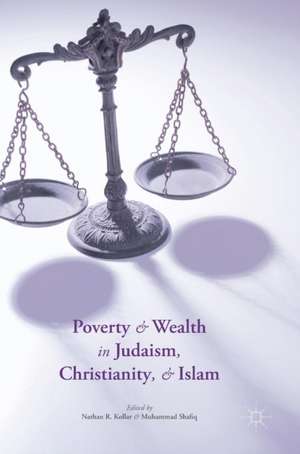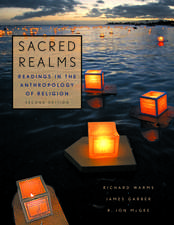Poverty and Wealth in Judaism, Christianity, and Islam
Editat de Nathan R. Kollar, Muhammad Shafiqen Limba Engleză Hardback – 27 iul 2016
Contributors use the methodologies of religious studies to provide descriptions and comparisons of perspectives from Judaism, Christianity, and Islam on poverty and wealth. The book presents citations from the sacred texts of all three religions. The contributors discuss the interpretations of these texts and the necessary contexts, both past and present, for deciphering the stances found there. Poverty and Wealth in Judaism, Christianity, and Islam identifies and details a foundation of common values upon which individual and institutional decisions may be made.
| Toate formatele și edițiile | Preț | Express |
|---|---|---|
| Paperback (1) | 781.45 lei 43-57 zile | |
| Palgrave Macmillan US – 31 mai 2018 | 781.45 lei 43-57 zile | |
| Hardback (1) | 785.74 lei 43-57 zile | |
| Palgrave Macmillan US – 27 iul 2016 | 785.74 lei 43-57 zile |
Preț: 785.74 lei
Preț vechi: 958.21 lei
-18% Nou
Puncte Express: 1179
Preț estimativ în valută:
150.37€ • 156.03$ • 125.68£
150.37€ • 156.03$ • 125.68£
Carte tipărită la comandă
Livrare economică 17-31 martie
Preluare comenzi: 021 569.72.76
Specificații
ISBN-13: 9781349948499
ISBN-10: 1349948497
Pagini: 324
Ilustrații: XXXII, 324 p. 6 illus., 4 illus. in color.
Dimensiuni: 148 x 210 x 25 mm
Greutate: 0.55 kg
Ediția:1st ed. 2016
Editura: Palgrave Macmillan US
Colecția Palgrave Macmillan
Locul publicării:New York, United States
ISBN-10: 1349948497
Pagini: 324
Ilustrații: XXXII, 324 p. 6 illus., 4 illus. in color.
Dimensiuni: 148 x 210 x 25 mm
Greutate: 0.55 kg
Ediția:1st ed. 2016
Editura: Palgrave Macmillan US
Colecția Palgrave Macmillan
Locul publicării:New York, United States
Cuprins
Introduction; Nathan R. Kollar.- PART I: Personifications of Poverty and Wealth.- 1. Reading Job 19:2-22: A Symbolic-Interactionist View of Poverty; Thomas Decker.- 2. The Story of Qarun (Korah) in the Qur’an and Its Importance for our Times; Zeki Saritoprak.- 3. Mughal Munificence: Care and Concern for the Poor in Islamic Hindustan from Tuladan to the Taj; Michael D.Calabria.- 4. Mary’s Magnificat: the Anawim and Church on the Margins; C. Denise Yarbrough.- Part II Doctrines about Poverty and Wealth.- 5. Socioeconomic and Gender Justice in the Qur’an: Modern Challenges; Zainab Alwani.- 6. Gospel Readings on Poverty and Affluence in Most Eastern and Western Churches; Regina Boisclair.- 7. Orthodox Christianity and Islam on Economic Justice: Universal Ideals and Contextual Challenges in Russia; Andrii Krawchuk.- PART III. Spiritual Traditions about Poverty and Wealth.- 8. From Possessio to Paupertas: The Emergence of Religious Poverty as a Critical Spiritual Component of Medieval Christianity; Michael Cusato.- 9. Poverty, Wealth and the Doctrine of Al-Fana’ in the Qur’an; Hussam S. Timani.- 10. Prophetic Ethics As Monotheistic Spirituality; Steven Kepnes.- 11. Christian Ethics: the “Non-Person” and the Insights of Liberation Theology for a Twentieth-First Century World; Curt Cadorette.- 12. A Spirituality for Rich and Poor: Contemporary Catholic Ideals for Economic Justice; Marvin L. Krier Mich.- PART IV. Sharing Our Wealth.- 13. Geography-Based Giving in Jewish Tradition; Malka Zeiger Simkovich.- 14. Poverty and Wealth in Islam’s Sacred Texts; Abdullah F. Al Lheedan.- 15. Overflowing Riches: Generosity, Divine and Human; Clare Amos.- Conclusion; Nathan R. Kollar.
Recenzii
“This book is an excellent comparison and contrast of each of these religions. … Overall, the comparison and contrast were done well and from a purely unbiased standpoint. I think that everyone should understand other cultures and how they view the major aspects of society. This book helps every Christian, Jew, or Muslim understand the views that the others hold to.” (Justin Dilliplane, Resolved for Christ, resolvedfc.blogspot.de, January, 2018)
Notă biografică
Nathan R. Kollar is Professor Emeritus of Religious Studies at St. John Fisher College, USA, retired Adjunct Professor in the Graduate School of Education, University of Rochester, USA, and Co-founder and Chair of the Board of the Center for Interfaith Studies and Dialogue at Nazareth College, USA.
Muhammad Shafiq is Executive Director of the Brian and Jean Hickey Center for Interfaith Studies and Dialogue and Professor of Islamic and Religious Studies at Nazareth College, USA. He holds the IIIT Chair in Interfaith Studies at Nazareth College.
Textul de pe ultima copertă
This book gathers scholars from the three major monotheistic religions to discuss the issue of poverty and wealth from the varied perspectives of each tradition. It provides a cadre of values inherent to the sacred texts of Jews, Christians, and Muslims and illustrates how these values may be used to deal with current economic inequalities.
Contributors use the methodologies of religious studies to provide descriptions and comparisons the perspectives of Judaism, Christianity, and Islam on poverty and wealth. The book provides citations from the sacred texts of all three religions along their interpretations, contexts, and elaboration for deciphering their stances. Poverty and Wealth in Judaism, Christianity, and Islam identifies and details a foundation of common values upon which individual and institutional decisions may be made.









